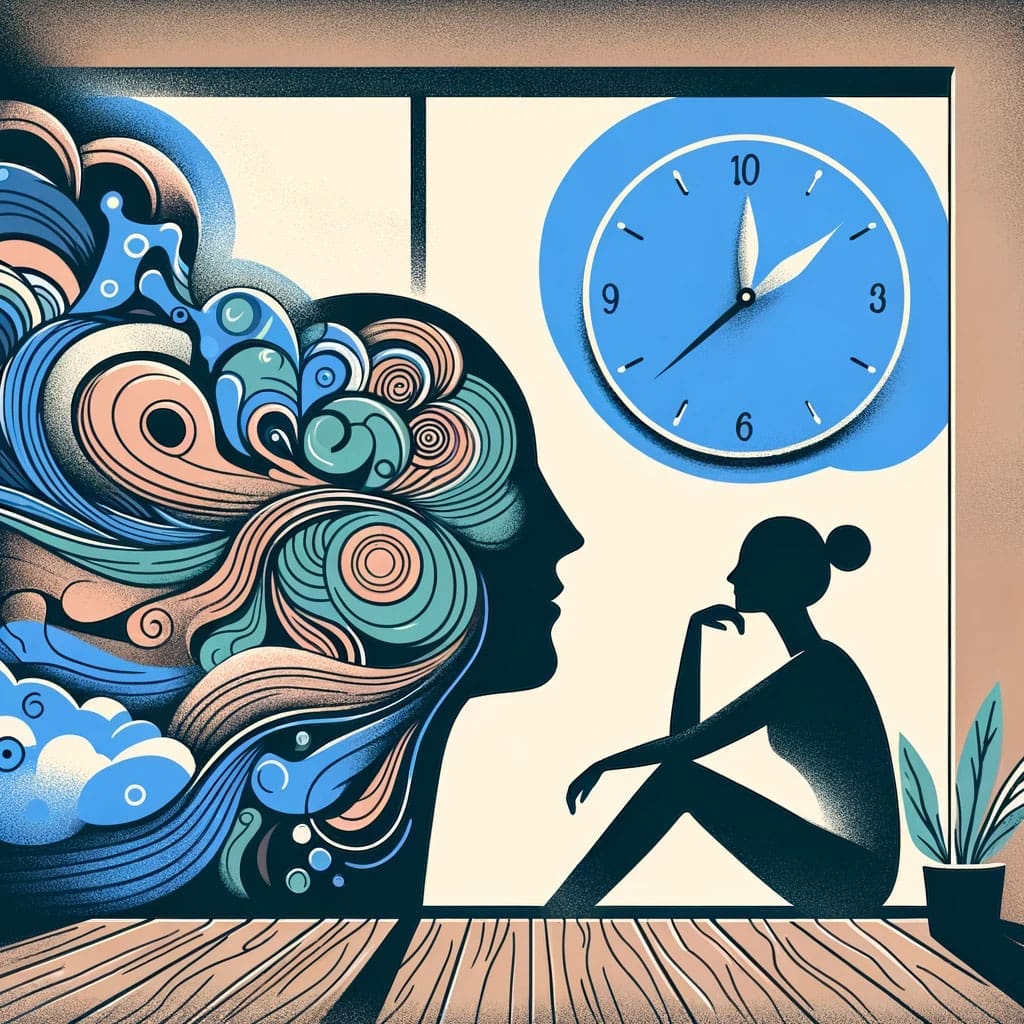Table of Contents
Key Points
- Anticipatory anxiety is characterized by an overwhelming sense of worry and fear that is largely future-oriented.
- There are several reasons why someone might develop anticipatory anxiety, including past experiences and negative thinking patterns.
- Some of the symptoms of anticipatory anxiety include racing thoughts, difficulty breathing, and heart palpitations.
- Anticipatory anxiety is common for teens, and over 38% of them are estimated to be struggling with an anxiety-based disorder.
- Several coping strategies can be effective in managing this kind of anxiety, including journaling and creative expression.
What Is Anticipatory Anxiety?
Anticipatory anxiety refers to a challenging emotional state in which someone experiences rising fear around a future event or situation that has yet to take place.[1] Characterized by excessive worry and apprehension, anticipatory anxiety—the “fear of future fear”—can be manifested physically, emotionally, and cognitively, leading to a cycle of negative thoughts and heightened distress. Anticipatory anxiety is not classified as a disorder in and of itself but rather a symptom of other common anxiety-based disorders, such as social anxiety.[2]
While feeling concerned about the future is a normal experience to have, anticipatory anxiety tends to last longer than other kinds of anxiety. Anticipatory anxiety can last for hours, days, or even weeks. It can also result in panic attacks, sleep disturbance, and other co-occurring mental health concerns as a result.[3]
What Causes Anticipatory Anxiety?
Anticipatory anxiety is characterized by an overwhelming sense of worry and fear that is largely future-oriented. Unlike regular worry, which tends to focus on present concerns, anticipatory anxiety fixates on what might happen in the days, weeks, or even months leading up to the event in question. As the mind races with potential negative outcomes, the body responds with symptoms such as increased heart rate, shallow breathing, muscle tension, and stomach discomfort.
While everyone’s experience of anticipatory anxiety is unique, there can be several factors that frequently contribute to its development:
- Past Experiences: Previous negative experiences can often create a sense of dread regarding potential similar events in the future. If someone had an uncomfortable experience in one particular situation, they may then become more anxious about facing similar situations going forward. Example: You failed your driver’s test the first time and felt a growing sense of concern at having to take the test again.
- Perfectionism: Many people who sometimes set extremely high standards for themselves might experience anticipatory anxiety as they worry about the consequences of not meeting their own expectations or the perceived expectations of others. Example: You always get straight-As in school, and as a result, are now feeling anxious about the potential of getting a lower grade on a future exam.
- The Fear Of Judgment: Concerns about how we are viewed by others can drive anticipatory anxiety in social situations. The fear of judgment or criticism can often cause distress long before the actual event itself. Example: Moving to a new school and being concerned about how others might perceive you.
- Feeling A Lack of Control: Anticipatory anxiety can also arise when an individual feels that they have little control over a particular situation or their general circumstances. Such uncertainties can trigger worry and apprehension when thinking about a forthcoming event or occurrence. Example: Worrying that your parents might lose their jobs or if you’ll be able to get into a good school for college.
- Catastrophic Thinking: Catastrophic thinking, or the tendency to predict the worst possible outcome,[4] is a common cause of anticipatory anxiety. Thinking that something awful is about to happen can easily lead to a rising sense of anxiety and dread in the lead-up to future plans and events. Example: “I don’t know how to do this assignment. I’ll probably get an F since I can’t figure this out.”
What Are The Symptoms of Anticipatory Anxiety?
The symptoms of anticipatory anxiety are similar to those experienced in several forms of anxiety and may include:
- Struggling to concentrate
- Hyperventilation or shortness of breath
- Racing thoughts
- Chest pain and heart palpitations
- Panic attacks
- Fatigue
- RestlessnessAvoidance of certain situations
- Isolation
How Can I Manage Anticipatory Anxiety?

Dealing with anticipatory anxiety is no fun for teens—especially when we consider that it can last for months leading up to a future event (much less a future event that may not even happen). An estimated 31.9% of teens aged 13 to 18 have an anxiety disorder, with an estimated 8.3% among them estimated as having a severe impairment as a result.[5]
Thankfully, there are several strategies you can look to when it comes to better managing the effects of anticipatory anxiety on your day-to-day life:
Mindfulness and Grounding Techniques
Mindfulness, or the practice of focusing your awareness on the present moment, has proven to be an effective tool against anxiety.[6] Incorporating mindfulness practices and positive affirmations into your daily routine can help to anchor you to the present moment, reducing the impact of future-based worries.
Journaling and Creative Expression
Engaging in creative outlets, such as writing, art, or music, can help teens externalize their thoughts and emotions about the future in the present, which can help to increase their self-awareness and insight into the problem.
Self-Care
Regular exercise, eating well, and getting adequate sleep can all positively impact your overall well-being, along with decreasing the effects and frequency of anticipatory anxiety around the future.
Utilize Cognitive-Behavioral Therapy (CBT) Principals
By challenging negative and catastrophic thoughts, individuals who suffer from anticipatory anxiety can begin to note patterns in their thoughts, which influence their emotions and behaviors. Try keeping a record of your negative thoughts to see what cognitive distortions you can identify.[7]
Talk To Your Supports
Don’t suffer in silence—speak to your friends and family about what you’ve been going through. They can provide you with validation and encouragement as you work to overcome your anxiety, making you less isolated and feel more supported.
Learn New Stress Management Techniques
Sometimes, worrying about the future can lead us to develop negative stress management, such as procrastination. Learning more about time management, problem-solving skills, and assertiveness can help you better handle the demands of life and reduce the amount of anticipatory anxiety you’re feeling.
Seek Professional Guidance For Anticipatory Anxiety
Although anticipatory anxiety can be challenging, there are several ways to decrease its effect on your life. We all worry about the future from time to time, but if you find yourself consumed with negative thoughts and rising anxiety about things that have yet to happen—or that may never happen at all—then the time might be right to seek professional help to support you.
Working with a licensed, qualified mental health professional can help you gain new insights and learn new coping strategies to tackle anticipatory anxiety.
Frequently Asked Questions About Anticipatory Anxiety
Absolute Awakenings Treatment Center Editoral Guideline
At Absolute Awakenings, we take information integrity seriously. We have dedicated our resources to ensure that all content published to our blog is medically sound. As such, all content on our blog has been thoroughly reviewed by a doctorate level clinician such as a Medical Doctor, or Psy.D, so that you can trust all of the data we publish.







